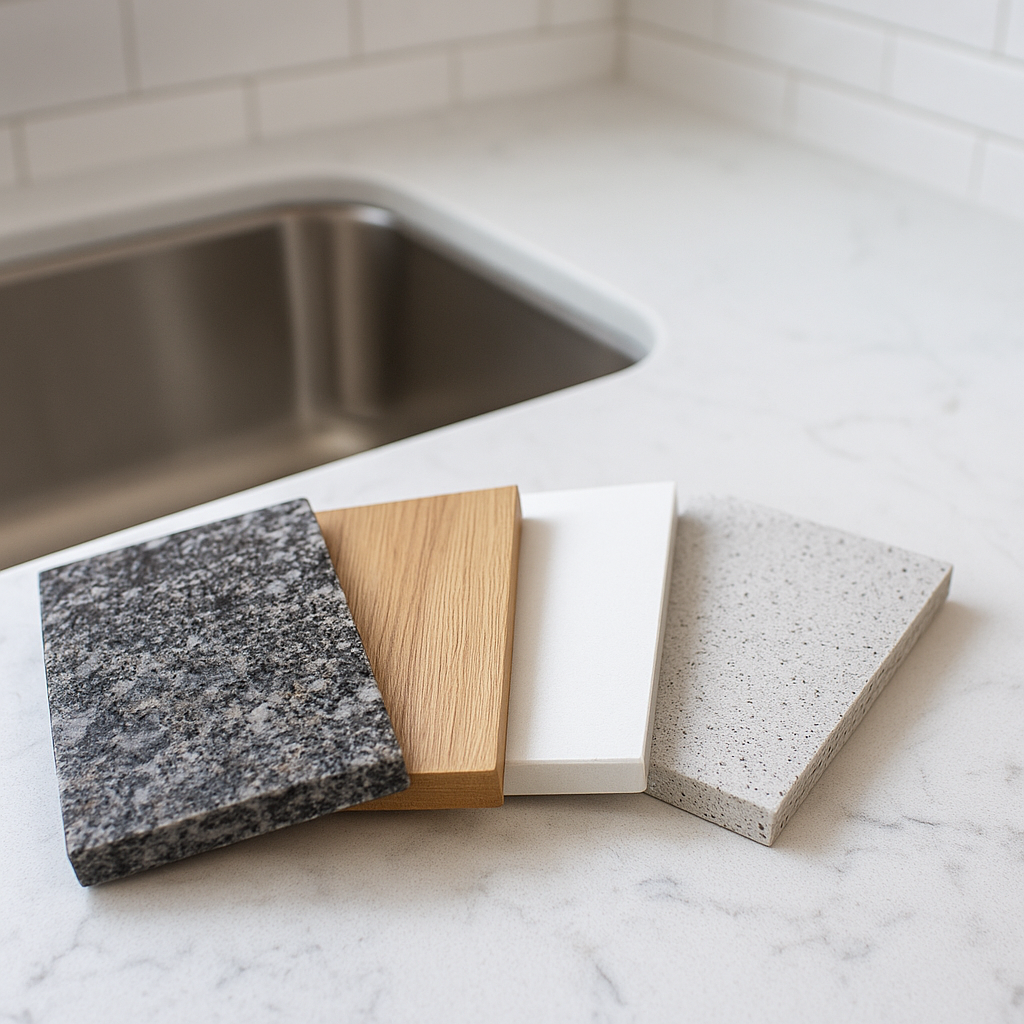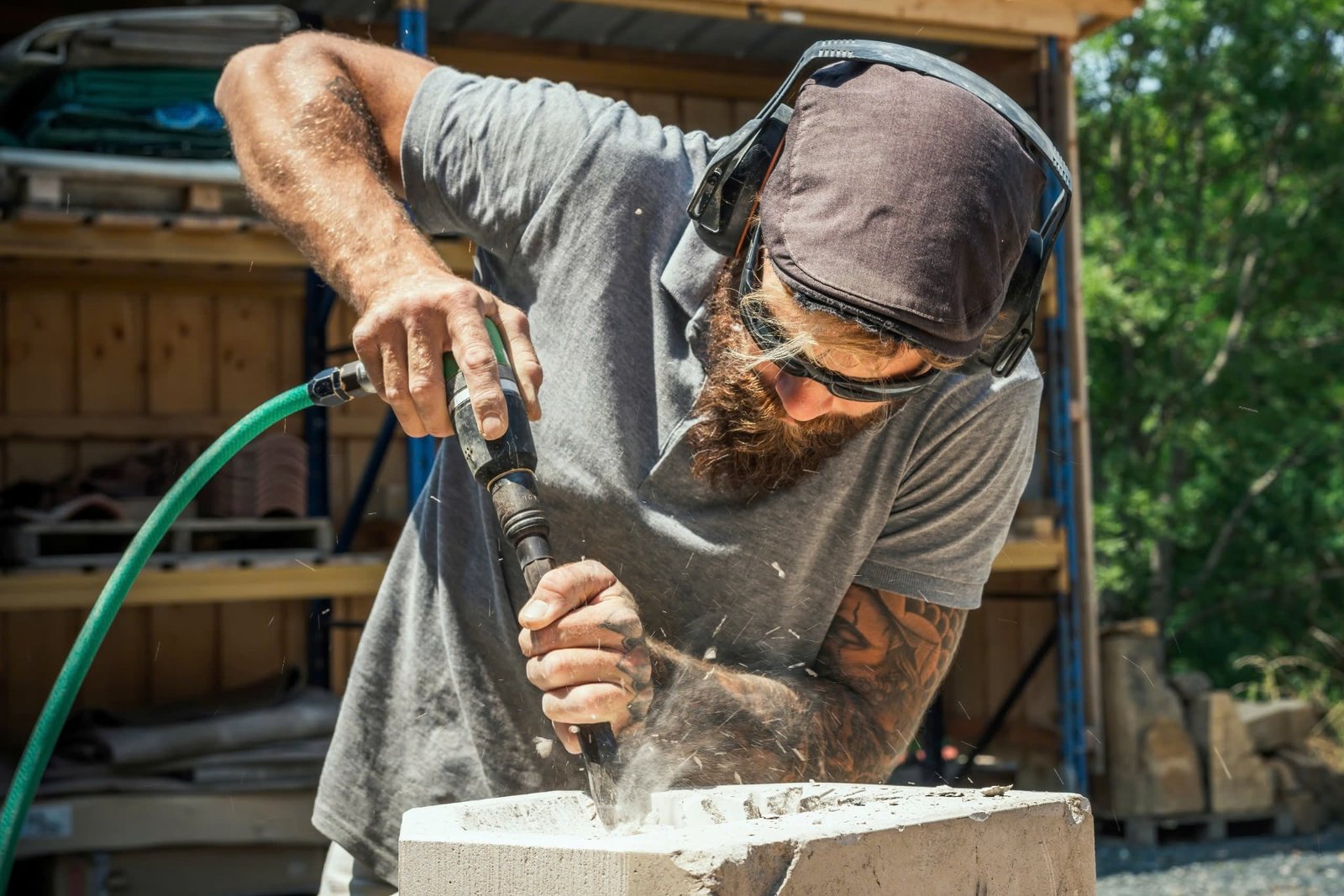
choosing the right material for your countertop installation is one of the most critical decisions in any kitchen renovation.
Choosing the right material for your countertop installation is one of the most critical decisions in any kitchen renovation. With numerous materials available—each offering unique benefits in style, durability, cost, and maintenance—it’s essential to align your choice with your lifestyle, budget, and kitchen goals.
In this guide, we’ll walk you through the top materials used in modern kitchen countertop installation, help you compare them, and provide expert insight into how your material selection impacts the countertop installation cost, performance, and longevity.

Why Material Selection Matters in Countertop Installation
Your countertop isn’t just a visual focal point—it’s a high-traffic, functional work surface. The material you select determines:
- The level of durability against scratches, heat, and stains
- The type of care and cleaning required
- Long-term maintenance and countertop repair needs
- The complexity of kitchen countertop fitting
- Overall project cost
When chosen wisely, the right material will enhance your kitchen’s aesthetic and usability for decades. It’s also a key step in modernizing your home, as seen in Why Follow Trends in Countertop Installation?.
Top Materials for Countertop Installation
Let’s explore the most popular countertop materials used in residential kitchens today.
1. Granite
Granite countertop installation remains a top choice for its natural beauty and durability.
Pros:
- Heat and scratch-resistant
- Wide range of colors and patterns
- Adds real estate value
- Each slab is unique
Cons:
- Requires periodic sealing
- Can be costly depending on the grade
- Heavy material may require extra support
Best for: Homeowners seeking luxury, durability, and a one-of-a-kind look.
2. Quartz
Quartz countertop installation has surged in popularity thanks to its combination of strength, consistency, and low maintenance.
Pros:
- Non-porous (stain-resistant, no sealing needed)
- Highly durable and scratch-resistant
- Uniform appearance
- Available in modern and natural designs
Cons:
- Less heat-resistant than granite
- Can discolor under direct sunlight
Best for: Busy families and those looking for a balance of style and easy care.
3. Marble
Marble offers an elegant, timeless appearance—but with trade-offs.
Pros:
- Naturally cool surface (ideal for baking)
- Sophisticated, high-end look
- Adds resale value
Cons:
- Easily stains and scratches
- Requires frequent sealing
- Higher countertop installation cost
Best for: Decorative kitchens with lighter use or as an accent piece.
4. Butcher Block (Wood)
Wood offers a warm, rustic feel and is ideal for prepping food.
Pros:
- Natural, eco-friendly look
- Can be sanded and refinished
- Great for cutting and chopping
Cons:
- Prone to scratches and dents
- Requires oiling to prevent drying/cracking
- Not ideal near wet zones
Best for: Homeowners seeking natural warmth or a farmhouse aesthetic.
5. Solid Surface (e.g., Corian)
Solid surfaces offer seamless installation and a wide color palette.
Pros:
- Easy to repair scratches or burns
- Seamless integration with sinks and backsplashes
- Non-porous and hygienic
Cons:
- Less heat-resistant
- Not as scratch-resistant as quartz or granite
Best for: Those looking for seamless, modern surfaces at a mid-range cost.
6. Concrete
Concrete offers a bold, industrial vibe and complete customization.
Pros:
- Custom-molded to fit any space
- Can be tinted or textured
- Durable and strong
Cons:
- Prone to cracking
- Requires sealing
- Heavy and may increase labor costs
Best for: Modern kitchens or artistic, high-design spaces.
7. Laminate
Laminate remains a budget-friendly option with improving visual quality.
Pros:
- Affordable
- Available in various colors and textures
- Easy to clean
Cons:
- Not heat or scratch-resistant
- Difficult to repair
- Shorter lifespan
Best for: Budget-conscious renovations or temporary surfaces.
Factors to Consider Before Choosing Your Countertop Material
1. Budget
Your budget will largely determine your material options and affect the total countertop installation cost.
- Laminate: $20–$50/sq.ft.
- Butcher block: $40–$100/sq.ft.
- Quartz: $70–$150/sq.ft.
- Granite: $80–$200/sq.ft.
- Marble: $100–$250/sq.ft.
2. Usage Habits
Do you cook daily, host events, or use your kitchen lightly? Choose a material that aligns with your activity level and maintenance tolerance.
3. Maintenance Requirements
Granite and marble require sealing. Quartz, laminate, and solid surfaces are lower maintenance. Be honest about how much upkeep you’re willing to handle.
4. Aesthetic Preferences
Material colors, patterns, and edge profiles impact the overall look. Modern kitchens favor clean lines and light tones, while traditional designs may lean toward rich, veined surfaces.
Installation Impact: How Materials Affect Technique
Different materials require different installation methods. For example:
- Quartz and granite need seam setting tools and precision fabrication
- Butcher block requires sealing and moisture-resistant adhesives
- Concrete must be custom poured and reinforced
To understand how these techniques influence labor, read What Techniques Are Used in Countertop Installation?
Local Factors: “Countertop Installation Near Me”
Don’t overlook regional trends and availability. Local professionals often have better access to certain stone types or fabrication methods. Search for “countertop installation near me” to:
- View slab selections in person
- Compare material costs
- Check contractor portfolios and reviews
Final Thoughts
Choosing the right material for your countertop installation is about more than appearance—it’s about finding the perfect balance between style, performance, maintenance, and budget. Whether you go for a luxurious granite countertop installation, a minimalist quartz surface, or a sustainable butcher block, the right choice will transform your kitchen both visually and functionally.

